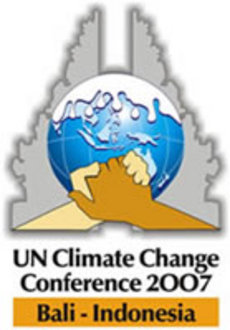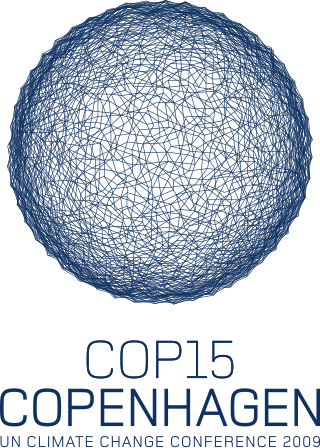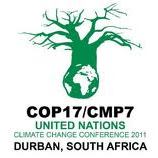
The Kyoto Protocol was an international treaty which extended the 1992 United Nations Framework Convention on Climate Change (UNFCCC) that commits state parties to reduce greenhouse gas emissions, based on the scientific consensus that (part one) global warming is occurring and (part two) that human-made CO2 emissions are driving it. The Kyoto Protocol was adopted in Kyoto, Japan, on 11 December 1997 and entered into force on 16 February 2005. There were 192 parties (Canada withdrew from the protocol, effective December 2012) to the Protocol in 2020.
The United Nations Framework Convention on Climate Change (UNFCCC) established an international environmental treaty to combat "dangerous human interference with the climate system", in part by stabilizing greenhouse gas concentrations in the atmosphere. It was signed by 154 states at the United Nations Conference on Environment and Development (UNCED), informally known as the Earth Summit, held in Rio de Janeiro from 3 to 14 June 1992. Its original secretariat was in Geneva but relocated to Bonn in 1996. It entered into force on 21 March 1994.

The 2007 United Nations Climate Change Conference took place at the Bali International Conference Centre, Nusa Dua, Bali, Indonesia, between December 3 and December 15, 2007. Representatives from over 180 countries attended, together with observers from intergovernmental and nongovernmental organizations. The conference encompassed meetings of several bodies, including the 13th Conference of the Parties to the United Nations Framework Convention on Climate Change, the 3rd Meeting of the Parties to the Kyoto Protocol, together with other subsidiary bodies and a meeting of ministers.
After the 2007 United Nations Climate Change Conference held on the island of Bali in Indonesia in December 2007, the participating nations adopted the Bali Road Map as a two-year process working towards finalizing a binding agreement at the 2009 United Nations Climate Change Conference in Copenhagen, Denmark. The conference encompassed meetings of several bodies, including the 13th session of the Conference of the Parties to the United Nations Framework Convention on Climate Change and the third session of the Conference of the Parties serving as the meeting of the Parties to the Kyoto Protocol.

The 2009 United Nations Climate Change Conference, commonly known as the Copenhagen Summit, was held at the Bella Center in Copenhagen, Denmark, between 7 and 18 December. The conference included the 15th session of the Conference of the Parties to the United Nations Framework Convention on Climate Change (UNFCCC) and the 5th session of the Conference of the Parties serving as the meeting of the Parties to the Kyoto Protocol. According to the Bali Road Map, a framework for climate change mitigation beyond 2012 was to be agreed there.

The 2008 United Nations Climate Change Conference took place at PIF Congress Centre, Poznań International Fair (PIF), in Poznań, Poland, between December 1 and December 12, 2008. Representatives from over 180 countries attended along with observers from intergovernmental and nongovernmental organizations.
The Copenhagen Accord is a document which delegates at the 15th session of the Conference of Parties to the United Nations Framework Convention on Climate Change agreed to "take note of" at the final plenary on 18 December 2009.

The 2010 United Nations Climate Change Conference was held in Cancún, Mexico, from 29 November to 10 December 2010. The conference is officially referred to as the 16th session of the Conference of the Parties (COP 16) to the United Nations Framework Convention on Climate Change (UNFCCC) and the 6th session of the Conference of the Parties serving as the meeting of the Parties (CMP 6) to the Kyoto Protocol. In addition, the two permanent subsidiary bodies of the UNFCCC — the Subsidiary Body for Scientific and Technological Advice (SBSTA) and the Subsidiary Body for Implementation (SBI) — held their 33rd sessions. The 2009 United Nations Climate Change Conference extended the mandates of the two temporary subsidiary bodies, the Ad Hoc Working Group on Further Commitments for Annex I Parties under the Kyoto Protocol (AWG-KP) and the Ad Hoc Working Group on Long-term Cooperative Action under the Convention (AWG-LCA), and they met as well.

The BASIC countries are a bloc of four large newly industrialized countries – Brazil, South Africa, India and China – formed by an agreement on 28 November 2009. The four committed to act jointly at the Copenhagen climate summit, including a possible united walk-out if their common minimum position was not met by the developed nations. All are members of BRICS, which also includes Russia.

Karen Christiana Figueres Olsen is a Costa Rican diplomat who has led national, international and multilateral policy negotiations. She was appointed Executive Secretary of the UN Framework Convention on Climate Change (UNFCCC) in July 2010, six months after the failed COP15 in Copenhagen. During the next six years she worked to rebuild the global climate change negotiating process, leading to the 2015 Paris Agreement, widely recognized as a historic achievement.
This article is about certain views on the Kyoto Protocol to the United Nations Framework Convention on Climate Change.

The 2011 United Nations Climate Change Conference (COP17) was held in Durban, South Africa, from 28 November to 11 December 2011 to establish a new treaty to limit carbon emissions.

The 2012 United Nations Climate Change Conference was the 18th yearly session of the Conference of the Parties (COP) to the 1992 United Nations Framework Convention on Climate Change (UNFCCC) and the 8th session of the Meeting of the Parties (CMP) to the 1997 Kyoto Protocol. The conference took place from Monday 26 November to Saturday 8 December 2012, at the Qatar National Convention Centre in Doha.

The United Nations Climate Change Conference, COP19 or CMP9 was held in Warsaw, Poland from 11 to 23 November 2013. This is the 19th yearly session of the Conference of the Parties to the 1992 United Nations Framework Convention on Climate Change (UNFCCC) and the 9th session of the Meeting of the Parties to the 1997 Kyoto Protocol. The conference delegates continue the negotiations towards a global climate agreement. UNFCCC's Executive Secretary Christiana Figueres and Poland's Minister of the Environment Marcin Korolec led the negotiations.

The United Nations Climate Change Conferences are yearly conferences held in the framework of the United Nations Framework Convention on Climate Change (UNFCCC). They serve as the formal meeting of the UNFCCC parties to assess progress in dealing with climate change, and beginning in the mid-1990s, to negotiate the Kyoto Protocol to establish legally binding obligations for developed countries to reduce their greenhouse gas emissions. Starting in 2005 the conferences have also served as the "Conference of the Parties Serving as the Meeting of Parties to the Kyoto Protocol" (CMP); also parties to the convention that are not parties to the protocol can participate in protocol-related meetings as observers. From 2011 to 2015 the meetings were used to negotiate the Paris Agreement as part of the Durban platform, which created a general path towards climate action. Any final text of a COP must be agreed by consensus.

The 2015 United Nations Climate Change Conference, COP 21 or CMP 11 was held in Paris, France, from 30 November to 12 December 2015. It was the 21st yearly session of the Conference of the Parties (COP) to the 1992 United Nations Framework Convention on Climate Change (UNFCCC) and the 11th session of the Meeting of the Parties (CMP) to the 1997 Kyoto Protocol.

The 2016 United Nations Climate Change Conference was an international meeting of political leaders and activists to discuss environmental issues. It was held in Marrakech, Morocco, on 7–18 November 2016. The conference incorporated the twenty-second Conference of the Parties (COP22), the twelfth meeting of the parties to the Kyoto Protocol (CMP12), and the first meeting of the parties to the Paris Agreement (CMA1). The purpose of the conference was to discuss and implement plans about combatting climate change and to "[demonstrate] to the world that the implementation of the Paris Agreement is underway". Participants work together to come up with global solutions to climate change.

The 2019 United Nations Climate Change Conference, also known as COP25, was the 25th United Nations Climate Change conference. It was held in Madrid, Spain, from 2 to 13 December 2019 under the presidency of the Chilean government. The conference incorporated the 25th Conference of the Parties to the United Nations Framework Convention on Climate Change (UNFCCC), the 15th meeting of the parties to the Kyoto Protocol (CMP15), and the second meeting of the parties to the Paris Agreement (CMA2).
The history of climate change policy and politics refers to the continuing history of political actions, policies, trends, controversies and activist efforts as they pertain to the issue of global warming and other environmental anomalies. Dryzek, Norgaard, and Schlosberg suggest that critical reflection on the history of climate policy is necessary because it provides 'ways to think about one of the most difficult issues we human beings have brought upon ourselves in our short life on the planet’.

The timeline of international climate politics is a list of events significant to the politics of climate change.















